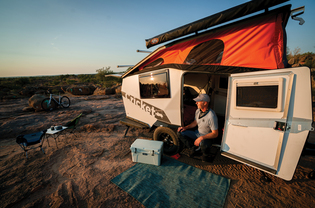
Ally Hardgrave
Garrett Finney ’86, ’90MArch, envisioned a better way to go camping
—somewhere between an RV and a tent. Then he designed it.
View full image
Garrett Finney ’86, ’90MArch, was designing furniture in New York City when a friend asked if he wanted a job at NASA. It was 1999. Sure, he said. Engineers had conquered the challenge of keeping people alive in space, but with little regard to human needs beyond food, air, and water. Finney’s job was to account for less obvious demands. He moved to Houston.
A decade into the job, Finney, who had grown up attending summer camp in Maine, wondered how his work at NASA might translate to the world of camping. He called Airstream and explained why they should hire him to reinvent the RV. The company declined. He began to daydream about crafting his own compact, durable, and comfortable space for nights outdoors. He shared his idea with his doctor, who shared the idea with his brother, who, after some probing, offered Finney $50,000. TAXA was born.
“My fantasy is being around a campfire with my best friends,” Finney says. “TAXA responds to the question ‘How do we get more people outside, to change their minds and souls?’”
Dylan Walsh: You seem, to put it mildly, opposed to the ethics of RVs. Why?
Garrett Finney: We avoid the word “RV” at all costs. We use “habitat.” We’re about to use “adventure vehicle.” I want a comfortable place to sleep at night, out of the weather, but I’m philosophically opposed to a house on wheels. That’s the point. You leave your house at home and go do something different.
DW: So TAXA was a reaction to that?
GF: I grew up in the mid-Atlantic states and was very outdoorsy. Then I moved to Texas to work at NASA, where I became knowledgeable and opinionated about people in tight spaces. I also had small kids and lived in a place where there are tarantulas and scorpions and poisonous snakes. Going outdoors I wanted a base camp, not a tent. I wondered: who makes the RV for the REI [Recreational Equipment, Inc.] person? Nobody did. I thought maybe I could.
Oh, and alligators. I didn’t mention the alligators.
DW: You did mention NASA. What were you doing there?
GF: I was senior architect of the habitability design center. This was at the beginning of the space station assembly, when NASA realized it had a quality-of-life problem. On a shuttle mission, an astronaut has up to sixteen hours of productive time. Over a six-month mission, the amount of useful time drops to six or eight hours. So where does that time go? Is it lost to stress, to boredom, to something else? The engineers had figured out the challenge of breathing, so NASA began to tackle less obvious issues of sustaining life in space. They hired architects, psychologists, psychiatrists, nutritionists. I could talk for hours about the work.
DW: You’ve described this work as managing “the choreography of people in small spaces.” What does that mean?
GF: Everything matters in confined spaces—whether you’re big or small, strong or weak, carrying groceries or with a muddy dog or changing a diaper. At NASA, my office would try to build full-scale mockups as soon as possible, because engineers are not necessarily trained to think about sharp corners. That’s something I brought to TAXA: building full-scale models as soon as possible. You have meetings in there with different-sized people bumping into each other. You quickly realize how different 20 inches is from 18.
DW: How has TAXA fared during COVID-19?
GF: We were lucky to be in the camping world during the pandemic. We grew a lot, which had its own challenges, but I’m excited that people are getting outside more. The product we sell? That’s background. The adventure is the point. [TAXA was acquired by the private equity firm L Catterton in 2022.]
DW: Do you have the next TAXA adventure planned?
GF: Not exactly, but I often have to camp for work. It’s product-testing.
I find that getting outside slows time down. I see this in the eyes and in the actions of children when they’re in nature. It stems, I think, from this deep sense of wonder.
 loading
loading